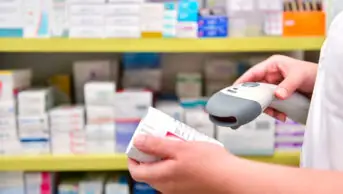An analysis by The Pharmaceutical Journal of the monthly drug tariff for England and Wales has revealed that the reimbursement prices of 897 products have increased in the five years between July 2017 and June 2022, which cost the NHS an additional £399.8m annually based on the latest available prescribing data for 2021/2022.
Of the medicines whose reimbursement prices have increased, those indicated in the British National Formulary (BNF) for psychoses and related disorders have had the most significant price increases, with some as high as 1,200% (see Figure).
The combined additional cost for each of the 55 antipsychotics that have had a price increase between July 2017 and June 2022 comes to £32.9m. The drug tariff also lists 33 antipsychotics that have maintained the same price over five years, and 16 antipsychotics that have decreased in price, which saves the NHS an estimated £1.2m annually.
Why are these price increases occurring?
The reasons are unclear, but manufacturers say that mental health medicines could be getting more expensive because of an increase in demand.
“To meet that demand, manufacturers have to invest in additional factory capacity for both active ingredients and the finished product, which will be underlying factors into why medicines prices may have increased in this area,” says Mark Samuels, chief executive of the British Generic Manufacturers Association (BGMA).
Manufacturer Genesis Pharmaceuticals says it was forced to increase its prices for chlorpromazine, used to treat the symptoms of schizophrenia, after increasing supplies to meet the demand left by a competing manufacturer that had exited the market.
David Solomon, director at Genesis Pharmaceuticals, says that in these instances, if their competitor re-enters the market, the manufacturer “might have to throw some of [their product] away, because we can’t sell it, so we have huge costs in doing that, but we can also put in very large price rises to compensate us”.
Teva, which manufactures chlorpromazine and olanzapine products, says it is “unable to comment on the specific prices of medicines and the mechanisms that lead to these changes”, but added that “there are a number of external factors” that can contribute to price changes.
The government is currently able to limit the prices of both generic and branded medicines under multiple pieces of legislation, including the Health Service Medicines (Price Control Penalties and Price Control Appeals Amendment) Regulations 2018, which allows the government to implement pricing caps on Category A generic medicine prices.
However, the third and most recent annual review of that legislation, published on 12 August 2022, revealed that the DHSC had yet to use these powers.
What does this mean for the NHS?
The price increases for antipsychotics are likely to put even more pressure on mental health services that are already struggling to cope with the fallout of the pandemic.
A report from the Care Quality Commission estimated that 10 million people – including 1.5 million children – could require new or additional mental health support as a direct result of the COVID-19 pandemic, with the severity of presentation also getting worse.
However, antipsychotic use has been increasing since before the pandemic. Between 2017/2018 and 2021/2022, the number of people who received at least one prescription item for antipsychotics increased by 9.5% from 766,000 people to 838,742 people. This has led to a 11.2% increase in the number of antipsychotic items prescribed in that time (see Figure 4).
Despite their growing cost, Ciara Ni Dhubhlaing, immediate former president of the College of Mental Health Pharmacy, said it is “unlikely” that patients taking antipsychotics, such as haloperidol, would be switched to an alternative.
“Haloperidol is used for maintenance treatment but also for management of aggression and violence in patients who may carry a risk to themselves or others — i.e. for rapid tranquilisation — so despite the costs and occasional supply issues requiring use of unlicensed products, I would expect its use to have continued unchanged,” she said.
Antipsychotics are not only linked with a rise in incidence of psychosis but can also be used in the treatment of other conditions, such as for mood stabilisation or to compensate for a lack of availability of psychosocial interventions in other conditions, such as personality disorders, or for lack of care services in dementia.
In 2021, researchers at University College London found that antipsychotic medication use had increased at almost double the rate of psychotic symptoms between 2000 and 2014. In that time, the researchers found that prevalence of psychotic symptoms in people aged 16–74 years living in England increased from 5.6% to 6.8%, while prevalence of antipsychotic medication use increased from 0.5% to 1.2%.
So, with the dispensing of antipsychotics consistently increasing, mental health providers have warned of the added strain to their budgets.
“[While] these medications will be essential for many people and it is down to clinical decision making, health leaders will be concerned that the spiralling costs of drugs used to treat psychoses and related disorders will erode their budgets even further and given that they will only have a limited financial envelop, leave them with less money to spend on other forms of care for patients,” says Sean Duggan, chief executive of the NHS Confederation’s Mental Health Network.
“It is also worrying that the prescribing costs of these drugs are counted as part of the mental health investment standard, which risks creating an illusion that systems are spending more money on other forms of patient care when this is not the case.”
A spokesperson for the Royal College of Psychiatrists added that the increasing medicine costs “combined with increased demand for mental health services will result in budgets being stretched further than ever before”.
“It’s vital that the government responds to these pressures to ensure all patients can access the care they need, when they need it,” they said.


